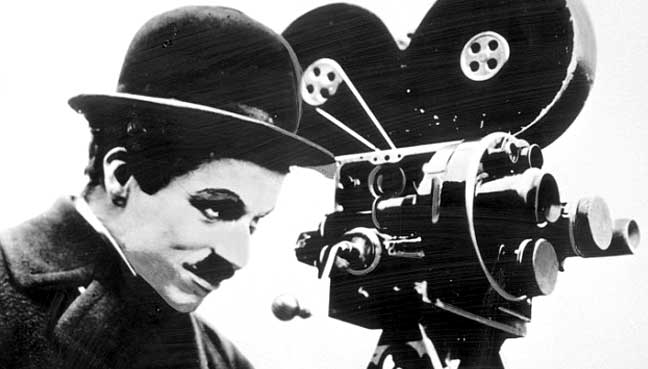"It seemed to me to be a very beautiful fairytale. Something that maybe only a man of his age can imagine, can dream. A very charming dream," Chaplin's now 69-year-old son Michael told AFP, his dark eyes sparkling as he recalls reading his father's script back in the 1970s.
Comic genius Charlie Chaplin, whose iconic films like "The Kid", "Modern Times", "The Great Dictator" and "City Lights" are admired and loved the world over, was planning something very different for what he intended to be his last picture.
A book published this week in Switzerland, where Chaplin spent the last 24 years of his life, for the first time gives a full account of the unfulfilled project.
Author Pierre Smolik says he was able to consult archives containing hundreds of pages of Chaplin's notes detailing the evolution of the project, two scripts, dialogues and a synopsis, as well as pictures that together give a picture of what his final film may have looked like if he had finished it.
- Mythical, winged girl -
After what turned out to be his last finished film, "A Countess from Hong Kong" flopped in 1967, Chaplin was distraught, but immediately dived into a new project, "The Freak", Smolik told AFP.
The famous filmmaker wrote the synopsis for the story in 1969, at the age of 80, and worked on the project for another two years at his sprawling, idyllic estate, Manoir De Ban, overlooking Lake Geneva.
He had the wings made, and even held a few rehearsals at a studio in Britain with his 18-year-old daughter Victoria, whom he wanted to embody the mythical lead character.
The film was meant to tell the story of a winged girl, a "freak" born to a couple of British missionaries, who one day falls onto the roof of a professor working in Chile.
He takes her in, names her Sarapha, and sees his house become of pilgrimage site for invalids who see the girl as an angel who might provide a cure.
But Sarapha is kidnapped and brought to London, where she is put on display before a crowd hungering for miracles.
She escapes, is captured and forced to prove she is human before she is finally released.
Sarapha decides to fly home to Chile, but does not make it. She plunges into the Atlantic and dies.
"When reading it, one can glimpse what this 'Freak' would have been: a subtle mixture of the tale, the fable, the dream, the amusing, tender or satirical comedy, black humour, the tragedy, the nightmare, suspense, poetry ," Smolik writes.
So why was it never completed?
Smolik, who grew up near Chaplin's estate and occasionally ran into the filmmaker as a boy, says there is no single explanation.
"He was quite old, and his wife did not want the shoot to weigh on his health," the author said, pointing out that Chaplin was a perfectionist who worked himself ragged on all of his films.
But there was also the more mundane problem of finding someone willing to insure the complex project, he said.
- Family secret -
After Chaplin's death in 1977, "the family generally was very protective about the script. They didn't really want it to fall into other hands," Michael said, explaining why so little was made of it previously.
"It was kept more or less as a secret," he said.
That was until 2010, when Smolik, who had already written a book about Chaplin and knew the family, asked if he could take a look at the documents.
"It's Pierre who pulled the wings out of the box again," Michael said.
Among the documents Smolik discovered a few sequences of film, never published, shot by Chaplin's wife Oona in the garden of his Swiss estate in 1974.
In the book's afterword, Victoria and Michael describe how Chaplin's family and friends had gathered at Manoir de Ban, when the old wheelchair-bound man suggested Victoria get the wings out of the cellar and put them on.
"Once he saw her with the wings on it was really quite amazing," Michael said, recalling how his father "got up out of his wheelchair and came down and said: 'No, no, you're not doing it right.' And he became a film director again."
But, he added, "It was kind of sad too, because obviously he was not going to make that film."
After filming the final scene, with Victoria dramatically crashing on the lawn instead of into the Atlantic, the wings were packed up for good.
But the public can soon catch a glimpse of the now yellowing feathered contraptions.
They will go on display at a new Charlie Chaplin museum opening at Manoir de Ban next April.
---------------------------------------------------------------------------------------------------------------------
Comic genius Charlie Chaplin, whose iconic films like "The Kid", "Modern Times", "The Great Dictator" and "City Lights" are admired and loved the world over, was planning something very different for what he intended to be his last picture.
A book published this week in Switzerland, where Chaplin spent the last 24 years of his life, for the first time gives a full account of the unfulfilled project.
Author Pierre Smolik says he was able to consult archives containing hundreds of pages of Chaplin's notes detailing the evolution of the project, two scripts, dialogues and a synopsis, as well as pictures that together give a picture of what his final film may have looked like if he had finished it.
- Mythical, winged girl -
After what turned out to be his last finished film, "A Countess from Hong Kong" flopped in 1967, Chaplin was distraught, but immediately dived into a new project, "The Freak", Smolik told AFP.
The famous filmmaker wrote the synopsis for the story in 1969, at the age of 80, and worked on the project for another two years at his sprawling, idyllic estate, Manoir De Ban, overlooking Lake Geneva.
He had the wings made, and even held a few rehearsals at a studio in Britain with his 18-year-old daughter Victoria, whom he wanted to embody the mythical lead character.
The film was meant to tell the story of a winged girl, a "freak" born to a couple of British missionaries, who one day falls onto the roof of a professor working in Chile.
He takes her in, names her Sarapha, and sees his house become of pilgrimage site for invalids who see the girl as an angel who might provide a cure.
But Sarapha is kidnapped and brought to London, where she is put on display before a crowd hungering for miracles.
She escapes, is captured and forced to prove she is human before she is finally released.
Sarapha decides to fly home to Chile, but does not make it. She plunges into the Atlantic and dies.
"When reading it, one can glimpse what this 'Freak' would have been: a subtle mixture of the tale, the fable, the dream, the amusing, tender or satirical comedy, black humour, the tragedy, the nightmare, suspense, poetry ," Smolik writes.
So why was it never completed?
Smolik, who grew up near Chaplin's estate and occasionally ran into the filmmaker as a boy, says there is no single explanation.
"He was quite old, and his wife did not want the shoot to weigh on his health," the author said, pointing out that Chaplin was a perfectionist who worked himself ragged on all of his films.
But there was also the more mundane problem of finding someone willing to insure the complex project, he said.
- Family secret -
After Chaplin's death in 1977, "the family generally was very protective about the script. They didn't really want it to fall into other hands," Michael said, explaining why so little was made of it previously.
"It was kept more or less as a secret," he said.
That was until 2010, when Smolik, who had already written a book about Chaplin and knew the family, asked if he could take a look at the documents.
"It's Pierre who pulled the wings out of the box again," Michael said.
Among the documents Smolik discovered a few sequences of film, never published, shot by Chaplin's wife Oona in the garden of his Swiss estate in 1974.
In the book's afterword, Victoria and Michael describe how Chaplin's family and friends had gathered at Manoir de Ban, when the old wheelchair-bound man suggested Victoria get the wings out of the cellar and put them on.
"Once he saw her with the wings on it was really quite amazing," Michael said, recalling how his father "got up out of his wheelchair and came down and said: 'No, no, you're not doing it right.' And he became a film director again."
But, he added, "It was kind of sad too, because obviously he was not going to make that film."
After filming the final scene, with Victoria dramatically crashing on the lawn instead of into the Atlantic, the wings were packed up for good.
But the public can soon catch a glimpse of the now yellowing feathered contraptions.
They will go on display at a new Charlie Chaplin museum opening at Manoir de Ban next April.
---------------------------------------------------------------------------------------------------------------------









 Home
Home Politics
Politics











